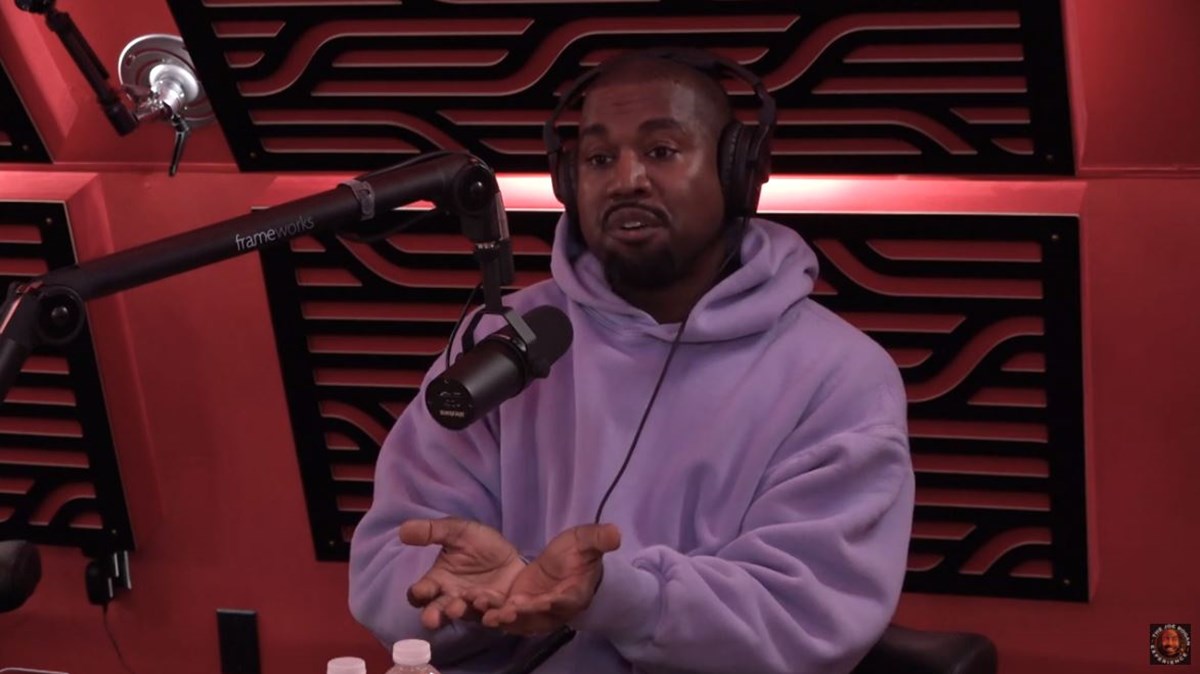Christian Genius Billionaire Kanye West has officially failed to become President Christian Genius Billionaire Kanye West, garnering only about 60,000 votes and failing to crack half a percent of the total in any state.
There were plenty of reasons not to vote for Kanye, including his famously erratic behavior, his complete lack of political experience, his failure to make it onto the ballot in most states, and the absence of any realistic path to victory for his “Birthday Party.” President Yeezy was always a pipe dream, and his chances in 2024 (he’s already announced he’ll be running) don’t look much better.
Kanye may not be a skilled politician, but he is, as Jon Miltimore has previously written at FEE, “an innovator who speaks glowingly about creativity and the virtue of competition” and has shown an admirable willingness to resist leftist groupthink.
This independent, creative, pro-market spirit was on full display in Kanye’s October 24 conversation with Joe Rogan on The Joe Rogan Experience. The nearly three-hour interview (see below), which consisted of several long, stream-of-consciousness Kanye monologues (or “symphon[ies] of ideas”) that Rogan barely interrupted, did not convince me that Kanye’s “calling is to be the leader of the free world.”
It did, however, make it very clear to me that he’s onto something. At least I think so. It can be hard to tell.
One particular moment stood out (17:10):
I asked a rhetorical question, about the dumbest question I've ever asked myself, I said, “Well, you know, how much does the earth cost?”… We can't buy it. We couldn't make enough money to buy the Earth. Right? So, that means we made money. So, if money is the key to all people's happiness and will solve everything and everyone's doing things for money, let's just make more money. But it's not about making more money. It's about keeping poor people poor and rich people rich and people keeping people in their place. And right now, we're experiencing the fall of Rome. Or, the Titanic has now hit a glacier. And there's people who would prefer to go down with the Titanic than to get on a lifeboat because they don't want to get seawater on their dress or their nice outfit. People are so programmed and brainwashed into classism and protectionism that it's difficult for people to embrace innovation.
There’s a lot to unpack here.
Kanye’s first point hinges on how we interpret the phrase “that means we made money.” If you read it as “that means we made money” (i.e. money isn’t real), then Kanye could use a lesson in basic monetary theory. (And, to be fair, it seems like that’s what Kanye means). But if we read it as “that means we made money” (i.e. we created value) Kanye’s statement becomes economically sound and far more consistent with his focus on entrepreneurship. If he speaks disparagingly of money at times, it’s because he understands that money isn’t an end in itself. It’s a way to track the creation of value.
His statement about buying the earth reminds me of a viral Tweet that’s become something of a meme: “CNN said the world is $217 trillion dollars [sic] in debt… who tf we owe? The Decepticons?”
It’s true that Megatron and Starscream won’t be showing up demanding payment any time soon, but the idea of the world being in debt is not entirely absurd. People borrow money because they believe that their future selves will be wealthier than their present selves. So if, as Kanye says, we don’t have “enough money to buy the Earth,” it’s not because money is a concept with no relationship to reality. It's because the earth’s value includes its potential for future economic growth. The human race has bet massive amounts of money on the assumption that the Gross Planetary Product will be greater in the future than it is today. There will always be economic winners and losers, but overall this is a safe bet, barring some world-historical catastrophe like a meteor impact.
Though Kanye seems to contradict himself at times, he has good instincts. When he says “let’s just make more money,” it sounds like a glaring instance of the inflationary fallacy, the idea that we can make people wealthier by simply printing more money. But, when he says, “that means we made money” and follows it up with a glowing endorsement of permissionless innovation, Kanye shows that he understands that wealth is not a zero-sum game. As long as there is innovation, value will continue to be created and the pie will continue to grow larger.
Hans Rosling’s famous YouTube video “200 Countries, 200 Years, 4 Minutes” provides an excellent illustration of this idea.
In 1810, no country on earth had an average income of $4,000 (in 2010 dollars) or an average life expectancy of 50 years. By 2010, almost everyone on earth was significantly wealthier and healthier. Between 1990 and 2015, over one billion people were lifted out of extreme poverty, a number larger than the worldwide population in 1800.
This did not happen because of a more equitable division of a static amount of resources, but because of a “great enrichment,” a rising tide that lifted all boats. In acknowledging the reality of economic growth, Kanye rebukes the progressive/socialist mindset that—as economist Tyler Cowen has written—puts the “cart before the horse” by prioritizing the distribution of wealth over the creation of wealth.
The driving force behind this enrichment is innovation, so the best way to spur growth is to give as many people as possible the resources and opportunities they need to be able to contribute creatively. “How do we look at the entire Earth as an opportunity to free everyone and create happiness for everyone?” Kanye asks at one point in the interview, before following it up by observing that there are “only a billion people on the Internet… We feel like the Internet is everything. It’s only like 15, you know, 18 percent of human beings” (88:50).
At first, the two thoughts seem unrelated (also, his numbers are wrong; according to one source, 4.3 billion people—about 57 percent of the global population—have internet access), but there is a connection. Kanye understands that the best way to increase freedom and happiness is to increase opportunities for innovation by giving more people access to the free flow of ideas and products made possible by the internet. More innovation means that more people’s needs can be more fully met. And not only their physical needs, but their relational and spiritual needs as well.
“I’m building a monastery,” Kanye says, “that will then be the future of monasteries.”
In context, “let’s just make more money” sounds less like an exhortation to print more bills and more like an acknowledgement that innovation creates wealth and that more wealth could be created if barriers to innovation were removed. To that end, Kanye’s symphony of ideas also features a rebuke of conservatism.
Conservatives are those who Kanye says would rather “go down with the Titanic than... get on a lifeboat” because they have been so “programmed and brainwashed into classism and protectionism” that they cannot “embrace innovation.” I consider myself a conservative, and I admire conservatism for its commitment to preserving those parts of our humanity and our heritage that are too valuable to lose. I am perfectly willing to admit, however, that conservatism has often served as a smokescreen for preserving unjust structures of privilege. Edmund Burke was right about the dangers of revolution, but he was also shamelessly shilling for the landed aristocracy, which at that time in British history held a tightly guarded monopoly on political and economic power.
F. A. Hayek addressed this tendency in his essay “Why I Am Not a Conservative”:
While the conservative inclines to defend a particular established hierarchy and wishes authority to protect the status of those whom he values, the liberal feels that no respect for established values can justify the resort to privilege or monopoly or any other coercive power of the state in order to shelter such people against the forces of economic change.
Kanye understands that innovation always produces a certain amount of creative destruction and that those who are already in positions of wealth and power frequently use those resources to try to stifle innovations and innovators That’s why Kanye identifies himself with disruptors like Steve Jobs and Nikola Tesla and why he’s so paranoid about potential backlash from his “war with the music industry.”
Still, Kanye is optimistic for the future. At one point in the interview, he holds up one of his wildly successful sneakers. “I’m going to make this shoe be twenty dollars,” he says, “and, you know, money isn't real, so that means the world should be eventually free. So, I'm going to manifest the world being free” (88:50).
Innovation, he firmly believes, will lead to a future in which better solutions can be delivered to more people more efficiently, though Kanye does overstate his case when he suggests that everything could one day be free.
A true post-scarcity economy may be an impossible fantasy, but it can be approached asymptotically. In other words, it can never be achieved, but the pursuit is potentially endless and will always bear fruit.
FEE Founding Vice President Henry Hazlitt said as much in his classic Economics in One Lesson: “[A]s there is no assignable limit to the extent to which unit costs of production can be reduced—until everything can be produced at no cost at all—there is no assignable limit to the amount of new capital that can be absorbed.” There is also no point at which we will outgrow our need for innovation.
Luckily for all of us, outside-the-box thinkers like Kanye are eager to continue providing it.

